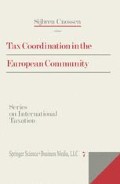Abstract
Why is the theory of optimal taxation (OT) an appropriate framework for dealing with tax harmonization in the European Community (EC)? The answer to this question can be deduced from one of the main objectives laid down in the EC Treaty. The activities of the Community shall include ‘the institution of a system ensuring that competition in the common market is not distorted’.1 Distortions are exactly the phenomena with which OT is primarily concerned.
The author wishes to thank Maurice Marchand and Jo Ritzen for their comments on his paper.
Access this chapter
Tax calculation will be finalised at checkout
Purchases are for personal use only
Preview
Unable to display preview. Download preview PDF.
Bibliography
Boadway, R., Maital, S. and Prachowny, M. ‘Optimal Tariffs, Optimal Taxes and Public Goods.’ Journal of Public Economics, 2, 1973.
Commission of the European Communities. ‘Report on the Scope for Convergence of Tax Systems in the Community.’ Bulletin of the European Communities, Supplement 1, 1980.
Dasgupta, P. and Stiglitz, J.E. ‘Benefit-Cost Analysis and Trade Policies.’ Journal of Political Economy, 82, 1974.
Dixit, A. and Munk, K.J. ‘Welfare Effects of Tax and Price Changes. A Correction.’ Journal of Public Economics, 8, 1977.
Dixit, A. and Norman, V. Theory of International Trade. Cambridge University Press, 1980.
Easson, A.J. Tax Law and Policy in the EEC. London: Sweet & Maxwell, 1980.
Friedlaender, A. and Vandendorpe, A. ‘Excise Taxes and the Gains from Trade.’ Journal of Political Economy, 76, 1968.
Gordon, R.H. ‘An Optimal Taxation Approach to Fiscal Federalism.’ The Quarterly Journal of Economics, 98, 1983.
Munk, K.J. ‘Optimal Taxation and Pure Profit.’ Scandinavian Journal of Economics, 80, 1978.
Shoven, J.B. ‘Applied General Equilibrium Tax Modeling.’ IMF Staff Papers, 30, 1983.
Vandendorpe, A.L. ‘Optimal Tax Structures in a Model with Traded and Non-Traded Goods.’ Journal of International Economics, 2, 1972.
Wiegard, W. ‘Distortionary Taxation in a Federal Economy.’ Zeitschrift für Nationalökonomie, 40, 1980.
Editor information
Editors and Affiliations
Rights and permissions
Copyright information
© 1987 Springer Science+Business Media New York
About this chapter
Cite this chapter
Rose, M. (1987). Optimal tax perspective on tax coordination. In: Cnossen, S. (eds) Tax Coordination in the European Community. Springer, Dordrecht. https://doi.org/10.1007/978-94-017-3206-2_5
Download citation
DOI: https://doi.org/10.1007/978-94-017-3206-2_5
Publisher Name: Springer, Dordrecht
Print ISBN: 978-94-017-3208-6
Online ISBN: 978-94-017-3206-2
eBook Packages: Springer Book Archive

